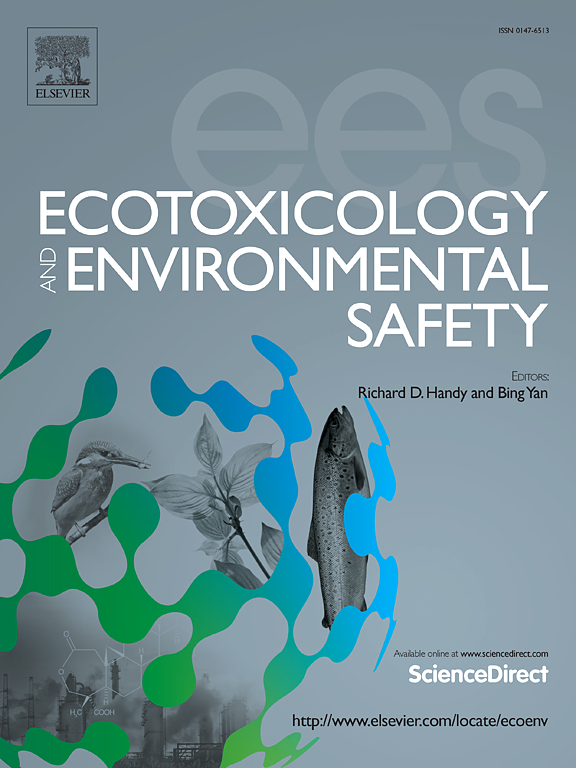2011-2019年PM2.5成分对高血压患者血压影响的纵向研究。
IF 6.2
2区 环境科学与生态学
Q1 ENVIRONMENTAL SCIENCES
引用次数: 0
摘要
大量研究证实,正常人的 PM2.5 暴露与血压(BP)水平之间存在联系。然而,PM2.5成分与高血压患者血压水平之间的关系尚未得到充分探讨。本研究选取了金昌市队列中的 12 971 例高血压患者,对其进行了近 9 年的随访。基于线性混合效应模型,通过单组分模型、组分联合模型和组分残差模型,分别评估了细颗粒物(PM2.5)和五种主要组分(硫酸盐(SO42-)、硝酸盐(NO3-)、铵盐(NH4+)、黑碳(BC)和有机物(OM))对血压(收缩压(SBP)、舒张压(DBP)、平均动脉压(MAP)和脉压(PP))的影响。结果发现,PM2.5 及其组分(SO42-、NO3-、NH4+、BC 和 OM)暴露量与血压水平呈正相关。在三个模型中,SO42-、BC 和 OM 对血压的影响最为显著。根据交互效应和分层分析的结果,BC 暴露对 SBP 的影响以及 PM2.5 及其五种成分对 PP 的影响在女性中大于男性。与老年高血压患者相比,OM 对青年和(或)中年高血压患者的 SBP、DBP 和 MAP 的影响更为显著。与非采暖季节相比,采暖季节 PM2.5 及其成分对血压的影响更大。同时,PM2.5 及其成分对高血压合并糖尿病患者血压的影响更大。因此,研究结果表明,PM2.5 暴露及其成分对高血压患者的血压有显著影响。女性和中青年高血压患者是敏感人群。实施源头控制和减少PM2.5排放(主要是SO42-、BC和OM)可能对控制高血压患者的血压水平具有重要意义,并可降低高血压患者罹患心血管疾病的风险。本文章由计算机程序翻译,如有差异,请以英文原文为准。
A longitudinal study on the effect of PM2.5 components on blood pressure in the hypertensive patients from 2011 to 2019
Extensive research has established the link between PM2.5 exposure and blood pressure (BP) levels among normal individuals. However, the association between PM2.5 components and BP levels in hypertensive patients has not been fully explored. In this study, 12 971 hypertensive cases from Jinchang cohort (in Jinchang City, China) with nearly 9 years of follow-up were enrolled. Based on the linear mixed-effect model, the effects of fine particulate matter (PM2.5) and five major components [sulfate (SO42-), nitrate (NO3-), ammonium (NH4+), black carbon (BC) and organic matter (OM)]on BP [systolic blood pressure (SBP), diastolic blood pressure (DBP), mean arterial pressure (MAP) and pulse pressure (PP)]were evaluated by single-component model, component-joint model and component-residual model, respectively. A positive correlation was found between PM2.5 as well as its components (SO42-, NO3-, NH4+, BC and OM) exposure and BP levels. The effects of SO42-, BC and OM on BP were observed to be the most robust among the three models. Based on the results of interaction effects and stratified analysis, the effect of BC exposure on SBP, and the effect of PM2.5 and its five components on PP were greater in female than in males. Compared with elderly hypertensive patients, OM had more significant effects on SBP, DBP and MAP in young and (or) middle-aged hypertensive patients. During the heating season, the effect of PM2.5 and its components on BP was grater compared to the non-heating season. Meanwhile, PM2.5 and its components have a greater influence on BP in patients with hypertension combined with diabetes. Therefore, the findings suggested that both PM2.5 exposure and its components had a significant effect on BP in patients with hypertension. Women and young and middle-aged hypertensive patient were the sensitive population. The implementation of source control and reduction of PM2.5 emission (mainly for SO42-, BC and OM) may be of great significance to control BP level and could reduce the risk of cardiovascular disease in patients with hypertension.
求助全文
通过发布文献求助,成功后即可免费获取论文全文。
去求助
来源期刊
CiteScore
12.10
自引率
5.90%
发文量
1234
审稿时长
88 days
期刊介绍:
Ecotoxicology and Environmental Safety is a multi-disciplinary journal that focuses on understanding the exposure and effects of environmental contamination on organisms including human health. The scope of the journal covers three main themes. The topics within these themes, indicated below, include (but are not limited to) the following: Ecotoxicology、Environmental Chemistry、Environmental Safety etc.

 求助内容:
求助内容: 应助结果提醒方式:
应助结果提醒方式:


